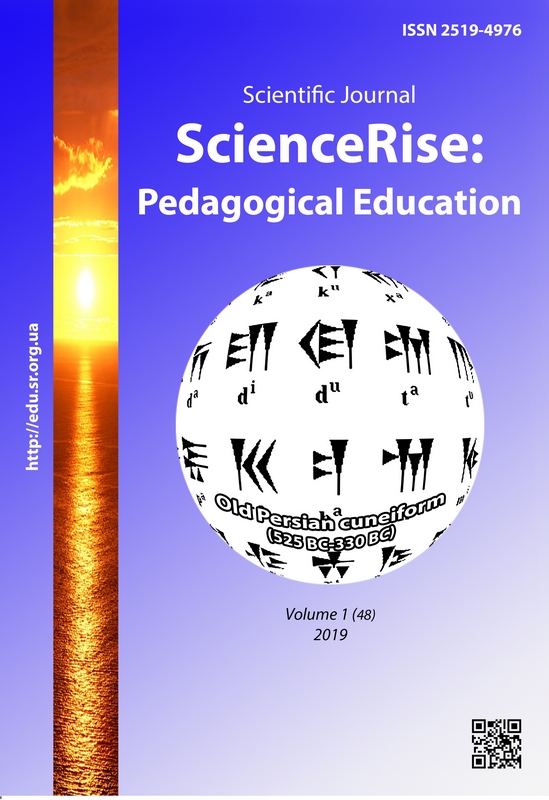Levels of formation of gnostic-technological competence of future speech therapist to work in the conditions of inclusive education
DOI:
https://doi.org/10.15587/2519-4984.2019.155002Keywords:
inclusion, inclusive education, inclusive environment, gnostic technological competence, developing environmentAbstract
We described the levels of formation of the gnostic-technological competence of future special teachers to work in inclusive education, using the method of questioning and analysis. A special educator must have the necessary level of professional competence for successful introduction into practice of various innovations, realization in the conditions of inclusion of the tasks. Specialist should have knowledge about the features of organization and work in inclusive education; he/she can creatively apply knowledge in organizing the interaction of all participants in educational and correctional work; to create a development environment in an inclusive educational institution, etc.
The authors highlighted the criterion of the gnostic-technological competence of future speech therapists to work in an inclusive educational institution and indicators for it: the meaningfulness of theoretical and technological knowledge about the features of the organization and work in inclusive education; creativity of technological knowledge and creative approach in organizing the interaction of all participants in educational and remedial work; creating a developing environment in an inclusive educational institution. We have distinguished the gnostic-deontological criterion, because the speech therapist should take into account the management, regulation of various mental conditions of the child with peculiarities of psychophysical development, correction of its defects in the interaction of "special pedagogue - child". Interaction with the child should not complicate his/her cognitive and educational activities with inclusive education. The child's health status depends on the educational and emotional load.
To carry out the experimental work, we have developed experimental tasks for selected criteria indicators in order to ascertain the level of formation of the gnostic-technological competence of future special teachers to work in inclusive educational institutions. For each task, a rating scale is formed
References
- Kolupayeva, A. (2014). Inklyuzyvna osvita yak model sotsialnoho ustroyu [Inclusive education as a model of social organization]. Osoblyva dytyna: navchannya i vykhovannya, 2, 7–18. Available at: http://nbuv.gov.ua/UJRN/DLog_2014_2_3
- Kuzava, І. B. (2009). Іnklyuzivna osvіta yak psihologo-pedagogіchna problema [Inclusive education as a psychological and pedagogical problem]. Naukovii vіsnik Volins'kogo nacіonal'nogo unіversitetu іmenі Lesі Ukrainki, 20, 35–38.
- Mіronova, S. P. (2010). Osoblivostі іnklyuzivnoi doshkіl'noi osvіti [Features of inclusive preschool education]. Vihovatel' – metodist doshkіl'nogo zakladu, 11, 8–15.
- Pinchuk, Yu. V. (2005). Systema profesiynoyi kompetentnosti vchytelya-lohopeda. Kyiv, 30.
- Savinova, N. V. (2014). Aktualni problemu formuvannia profesiinoi kompetentnosti vchyteliv-lohopediv [Actual problems of formation of professional competence of teachers-speech therapists]. Problemy pidhotovky suchasnoho vchytelia, 9 (1), 162–169.
- Savinova, N. V. (2015). Innovatyka v lohopedii [Innovation in speech therapy]. Science and Education a New Dimension. Pedagogy and Psychology, III (36 (74)), 51–55.
- Savinova, N. V., Berehova, M. I. (2015). Deontolohichna kompetentnist korektsiinoho pedahoha v umovakh inkliuzyvnoho navchannia [Deontological competence of correctional teacher in conditions of inclusive education]. Molodyi vchenyi, 2 (17 (IV)), 99–102.
- Corbett, J. (1999). Inclusive education and school culture. International Journal of Inclusive Education, 3 (1), 53–61. doi: http://doi.org/10.1080/136031199285183
- Volonino, V., Zigmond, N. (2007). Promoting Research-Based Practices Through Inclusion? Theory Into Practice, 46 (4), 291–300. doi: http://doi.org/10.1080/00405840701593873
- Sheremet, M. K. (2011). Pidhotovka korektsiynykh pedahohiv u vyshchykh navchalnykh zakladakh [Preparation of special teachers in higher educational institutions]. Zbirnyk naukovykh prats Kamyanets-Podilskoho natsionalnoho universytetu imeni Ivana Ohiyenka, 17 (1), 7–11.
Downloads
Published
How to Cite
Issue
Section
License
Copyright (c) 2019 Mariya Berehova

This work is licensed under a Creative Commons Attribution 4.0 International License.
Our journal abides by the Creative Commons CC BY copyright rights and permissions for open access journals.
Authors, who are published in this journal, agree to the following conditions:
1. The authors reserve the right to authorship of the work and pass the first publication right of this work to the journal under the terms of a Creative Commons CC BY, which allows others to freely distribute the published research with the obligatory reference to the authors of the original work and the first publication of the work in this journal.
2. The authors have the right to conclude separate supplement agreements that relate to non-exclusive work distribution in the form in which it has been published by the journal (for example, to upload the work to the online storage of the journal or publish it as part of a monograph), provided that the reference to the first publication of the work in this journal is included.







